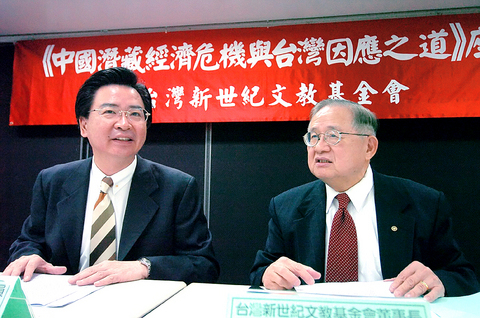The policy that bans Taiwanese firms from investing more than 40 percent of their net value in China has come under intense scrutiny, with many government officials concluding that it has been ineffective in stemming the surge of China-bound investment over the last decade, a top China affairs official said yesterday.
Mainland Affairs Council (MAC) Chairman Joseph Wu (
"Obviously the 40-percent cap set up in 1997 has failed to meet both the needs of the local industries and the government's goal of managing the flow of China-bound capital," Wu said at a forum held by the Taiwan New Century Foundation on how Taiwan can prepare itself for the hidden dangers of the Chinese economy.

PHOTO: WANG MIN-WEI, TAIPEI TIMES
Wu said that the government was currently reviewing the feasibility of the restriction, in the context of both allowing local industries to take advantage of the economic opportunities in China, and enhancing the industries' ability to diversify their investments in the global market.
Wu said there has been heated debate about the issue in the preliminary meetings for the upcoming Conference on Sustainable Economic Development scheduled for July 27 and July 28, and that the MAC was still soliciting opinions from businesses and academics.
In response to the threat by the Chinese National Federation of Industries to hold demonstrations in November if the government doesn't make progress on lifting the investment cap and ban on direct cross-strait air links, Wu said that the government is trying to find a balanced solution to the problem.
"Our consideration is not simply to lift the 40 percent investment cap. Rather, we are thinking about how to make the management of Taiwanese businesses' investment in China more effective, just and transparent," Wu said.
He added that the government's goal is to help Taiwanese people reach the cutting edge of their industries in the global market.
Wu said at the forum that the hidden dangers of China's economy are the widening gap between the rich urban cities on the eastern coast and the poor farming villages in the western hinterlands, increasing environmental pollution, rampant government corruption and the ever-more strict suppression of democracy.
Chang Ching-hsi (
Yang Chia-yen (

SHIPS, TRAINS AND AUTOMOBILES: The ministry has announced changes to varied transportation industries taking effect soon, with a number of effects for passengers Beginning next month, the post office is canceling signature upon delivery and written inquiry services for international registered small packets in accordance with the new policy of the Universal Postal Union, the Ministry of Transportation and Communications said yesterday. The new policy does not apply to packets that are to be delivered to China, the ministry said. Senders of international registered small packets would receive a NT$10 rebate on postage if the packets are sent from Jan. 1 to March 31, it added. The ministry said that three other policies are also scheduled to take effect next month. International cruise ship operators

HORROR STORIES: One victim recounted not realizing they had been stabbed and seeing people bleeding, while another recalled breaking down in tears after fleeing A man on Friday died after he tried to fight the knife-wielding suspect who went on a stabbing spree near two of Taipei’s busiest metro stations, Taipei Mayor Chiang Wan-an (蔣萬安) said. The 57-year-old man, identified by his family name, Yu (余), encountered the suspect at Exit M7 of Taipei Main Station and immediately tried to stop him, but was fatally wounded and later died, Chiang said, calling the incident “heartbreaking.” Yu’s family would receive at least NT$5 million (US$158,584) in compensation through the Taipei Rapid Transit Corp’s (TRTC) insurance coverage, he said after convening an emergency security response meeting yesterday morning. National

PLANNED: The suspect visited the crime scene before the killings, seeking information on how to access the roof, and had extensively researched a 2014 stabbing incident The suspect in a stabbing attack that killed three people and injured 11 in Taipei on Friday had planned the assault and set fires at other locations earlier in the day, law enforcement officials said yesterday. National Police Agency (NPA) Director-General Chang Jung-hsin (張榮興) said the suspect, a 27-year-old man named Chang Wen (張文), began the attacks at 3:40pm, first setting off smoke bombs on a road, damaging cars and motorbikes. Earlier, Chang Wen set fire to a rental room where he was staying on Gongyuan Road in Zhongzheng District (中正), Chang Jung-hsin said. The suspect later threw smoke grenades near two exits

The Forestry and Nature Conservation Agency yesterday launched a gift box to market honey “certified by a Formosan black bear” in appreciation of a beekeeper’s amicable interaction with a honey-thieving bear. Beekeeper Chih Ming-chen (池明鎮) in January inspected his bee farm in Hualien County’s Jhuosi Township (卓溪) and found that more than 20 beehives had been destroyed and many hives were eaten, with bear droppings and paw prints near the destroyed hives, the agency said. Chih returned to the farm to move the remaining beehives away that evening when he encountered a Formosan black bear only 20m away, the agency said. The bear